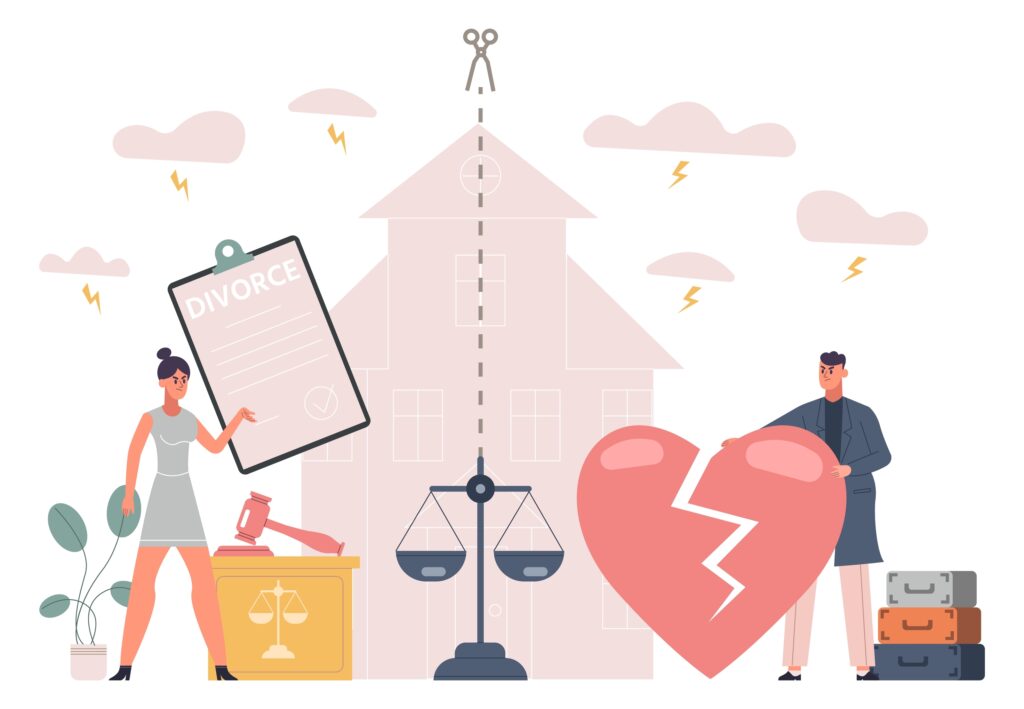How Co-Ownership Works | Pros and Cons of Co-Ownership | How to Co-Own After a Divorce | Alternatives
Home Bay aims to make real estate more transparent, honest, and affordable. We are committed to sharing unbiased content. Some of the links on our site are from our partners who compensate us. Learn more about us and our mission to simplify every step of the real estate journey.
It’s not unusual for couples to own a house together even after their divorce. In fact, it’s often the most practical solution, especially if there are children involved, because it can provide continuity during an otherwise uncertain time.
But co-owning a house with your ex can be much like a break-up — complicated.
Generally, there are four ways to handle a home during and after a divorce:
- Sell the house and split the proceeds.
- Buy the home from your ex by paying their share of equity — or vice versa.
- Exchange the home with your ex for an equal asset — or vice versa.
- Continue to co-own the house.
Considering the emotional roller coaster, we recommend working with an experienced divorce attorney who can help you navigate the process. Our guidance is based on research and real estate best practices — it does not constitute legal advice.
Before you make any decision, it’s also a good idea to get an appraisal and talk to a licensed real estate agent about your property. Knowledge is power, so learn your home’s fair value and what you could expect to make from selling it and splitting the profits with your ex.
Our friends at Clever Real Estate can match you with top agents in your area, ensuring greater confidence about your options after a divorce. No matter which course of action you decide to take, a Clever partner agent can help you navigate the process terrain and save you thousands in commission fees. Clever pre-negotiates 1.5% agent listing fees compared with the standard 3%, saving you an average of $7,000 on your home sale. Find local agents and save!
How Does Co-Owning a House With Your Ex After a Divorce Work?
Co-owning a house after divorce means both of your names will remain on the deed and the mortgage.
You might consider this arrangement instead of selling for a variety of good reasons:
- You have children still living at home
- One spouse can’t afford to buy out the other right away
- You’re underwater on the mortgage
- You’re expecting the market to improve
Depending on what you decide, you may both continue living in the home or agree that one spouse will move out. You’ll also need to decide if you will share mortgage payments or if one party will take sole responsibility for them.
If you do decide to keep the property in both of your names, prepare yourself for the emotional stress that can come from co-owning a property after divorce. Co-ownership usually means continued interaction with your ex, which can make it hard to move on.
Keeping a property in both names can also complicate the divorce from a legal standpoint. To protect yourself, include all of the details of the arrangement in your divorce agreement and get it approved by the relevant court.
How to Continue Home Co-Ownership After a Divorce
If you decide to keep the family home after a divorce, there are a few key things you can do to smooth the process.
- Decide on Terms of Agreement
- Record All Terms in Your Marital Settlement Agreement
- Get the Home Appraised
1. Decide on Terms of Agreement
If you plan to co-own your home after divorce, decide on the terms of the agreement at the outset. Make sure to discuss things like:
- How long each person will live in the home
- Who will make the mortgage payments
- Who will be responsible for other expenses like upkeep and repairs
- Who will take the mortgage interest deduction
- What will happen if one of the co-owners dies
- What will happen when one person wants to sell the property
- The timeline for a divorce buyout if one ex is working to buy the home from the other
- When you plan to sell the home, if applicable
2. Record All Terms in Your Marital Settlement Agreement
Record any relevant details about the treatment of your family home in your settlement agreement. A marital settlement agreement is a legally binding contract that covers all aspects of your divorce, including property division. This will provide clarity and protection for both of you in the event of a future dispute.
You might even consider attaching a co-ownership agreement form to serve as a written record of your agreement and for use in dispute resolution down the road.
While sample and template documents can be found online, we highly recommend working with an attorney to ensure the document is legally enforceable in your state.
Finally, get the agreement approved by the applicable court. In some cases, the court may require that you attend a hearing to discuss the terms of the agreement. We recommend using DivorceNet.com, where you can find answers to your divorce-related questions and save money. At $159, an online divorce is more affordable and faster than hiring a conventional lawyer, not to mention it provides peace of mind thanks to 100% court approvals.
| 💡Remember: Divorce Laws Vary By State Each state has its own laws and paperwork on divorce and settlements. Do your research on your state’s requirements and legal forms before you draft an agreement. Ultimately, it’s best to work with an attorney. |
3. Get the Home Appraised
Even if you and your ex are keeping the home, get it appraised so you can determine the value of your interest in the property. This is also necessary if you’re buying out your spouse’s interest in the property.
Pros and Cons of Co-Owning a House After Divorce
Co-owning a home with an ex can be complicated and emotionally taxing but makes sense in certain situations.
Pros 👍
- Grants more time for one spouse to buy out the other
- Allows children to stay in the same house
- May give you an opportunity to earn more on investment
Cons 👎
- May hurt your credit if you’re not able to make payments
- Not financially feasible for some
- Can be emotionally difficult
- Requires tough accounting decisions
- May result in higher taxes
Pros of Co-Owning a House After Divorce
You’ll Have More Time For One Spouse to Buy Out the Other
If one spouse wants to keep the house, they can buy out the other’s equity and become the sole owner. But the buyer needs cash on hand — in some cases, a lot of it. Continuing co-ownership for a period gives one spouse time to save before buying out the other. Note that the new owner will need to get a new mortgage in their name only.
Your Children Can Stay in the Same House
If you have young children and one spouse wants to stay in the family home, co-owning a house with your ex after a divorce could allow your children to stay in the same house and maintain some stability during and after the divorce.
You Could Earn More on Your Investment
If you haven’t owned your house long enough to make a profit on your sale, or if you expect the market to improve in the future, co-owning allows you to wait until there’s a better opportunity to sell. Or maybe you want to hold onto the house as a rental property that you both can draw passive income from.
Cons of Co-Owning a House After Divorce
It Could Hurt Your Credit
If your ex doesn’t make their portion of the mortgage payment, you’re on the hook. And if you can’t fill the gap and make your mortgage payments on time, both of your credit scores will suffer. If you’re worried about your or your ex’s ability to make payments, don’t take the risk of co-ownership.
| ⚠️ Caution: If you think there’s a chance your ex could file bankruptcy or be sued by a creditor, don’t co-own with them. If this happens, their share of the home could be seized or it could force a sale, causing you to lose some or all of your equity. This is one of the biggest risks associated with co-ownership. |
It’s Not Always Financially Feasible
Continued co-ownership might require one spouse to pay their current mortgage as well as payments on a new mortgage or rental. For many people, double housing payments are out of reach. Not to mention, it can be difficult for some to qualify for a second mortgage with one already under their belt.
It Can Be Emotionally Difficult
Co-owning a house after divorce requires communication and cooperation, which can be difficult under high-stress circumstances. If you’re not able to communicate and work together, continuing to co-own may not be the best option.
You’ll Have to Make Tough Accounting Decisions
Co-ownership requires figuring out how to divide expenses that come with homeownership, such as:
- Mortgage payments
- Property taxes
- Homeowners insurance and private mortgage insurance (PMI), if applicable
- Utilities
- Maintenance and repairs
You’ll have to determine who gets to take the mortgage interest deduction. These decisions can be difficult, especially if you don’t have a good relationship with your ex.
You May Lose Out on a Special Tax Benefit
If you decide to continue co-owning a house with your ex, you might lose out on a special tax exemption.
IRS Section 1041 gives divorced homeowners a pass on the typical capital gains tax — they don’t have to pay capital gains on their home sale if the home is sold within a year of the divorce. By comparison, homeowners must pay capital gains on their home sale proceeds unless they’ve lived in their home for two of the last five years.
So if you don’t sell the home within a year following your divorce, you won’t be eligible for the exemption.
But there is one exception — if you include plans in your settlement agreement to sell the house within six years of your divorce, you won’t have to pay any capital gains. Tax law is nuanced, so we recommend working with a divorce attorney to understand all tax implications before you choose to co-own a house after divorce.
Alternatives to Co-Owning a House After Divorce
If you decide not to keep the family home, you have options.
Before you decide, find out whether you live in a community property or equitable distribution state. These designations might help you decide which option is most beneficial to both you and your ex.
- Community property states: If you live in one of nine community property states, all of your marital assets are divided 50/50 and those you acquired before marriage are excluded. Community property states include:
- Arizona
- California
- Idaho
- Louisiana
- Nevada
- New Mexico
- Texas
- Washington
- Wisconsin
- Equitable distribution states: In equitable distribution states, parties can agree how to split the property. A judge distributes property if you and your ex-spouse are unable to agree.
The law around property distribution is nuanced and our guidance here doesn’t constitute legal advice. Consult with an attorney when making these decisions for you and your family.
Sell the Property
If you decide to sell the property, you’ll need to agree on how the proceeds will be divided. Once you reach an agreement, have the property appraised so that you can determine its fair market value.
We also recommend reaching out to a real estate agent to help decide on a competitive listing price. Working with an agent can streamline the process and help you sell faster, so you can get on with your life sooner.
Need to sell fast? Homes listed with a Clever partner agent sell 16% faster than the national average. Get connected to a Clever agent who can help you out.
Keep the Property and Buy Out Your Spouse’s Interest
If you decide to keep the property, you can buy out your spouse’s interest or vice versa.
Start by getting the property appraised to determine your equity in the home. Then negotiate a fair price for your spouse’s equity in the property. Once you reach an agreement, work with a real estate attorney to have the property transferred into your name only.
Give the Property to Your Spouse in Exchange for Another Asset
If you decide to give the property to your spouse, negotiate a fair tradeoff. For example, you may exchange the property for another asset, such as a retirement account or another piece of property.
FAQs About Co-Owning a House After a Divorce
Start by getting the property appraised to determine your equity in the home. Then negotiate a fair price for your spouse’s equity in the property. Once you reach an agreement, work with a real estate attorney to have the property transferred into your name only. Learn more about navigating a divorce buyout.
If you get a divorce, you’ll have several options for dealing with your shared house: sell the house and split the proceeds; buy the home from your ex by paying their share of equity — or vice versa; exchange the home with your ex for an equal asset — or vice versa; or continue to co-own the house. Learn more about your options after a divorce.



